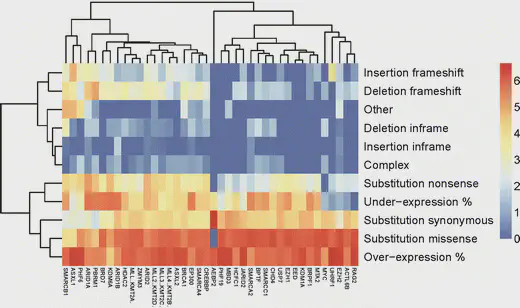The potential role of PHF6 as an oncogene; a genotranscriptomic/proteomic meta-analysis
 Image credit: Adrian Salavaty
Image credit: Adrian SalavatyAbstract
Epigenetic complexes control various pathways within the cells. Their abnormalities can be involved in the initiation and the progression of different types of cancer. Nucleosome remodeling and deacetylase (NuRD) is an epigenetic complex that comprises several subunits such as PHF6. Although PHF6 is reported as a tumor suppressor in some of the hematopoietic malignancies, its function is still challenging in other cancers. Our study aimed at investigating the role of PHF6 in different types of cancer. We conducted a meta-analysis of PHF6 in human cancers at genomic, transcriptomic, and proteomic levels. For this purpose, we acquired the data from several databases, and tried to statistically integrate and analyze the data in order to find the potential role of PHF6 in different tumors. The results demonstrated that although PHF6 has been previously known as a tumor suppressor gene, it was remarkably overexpressed in many cancer types such as breast and colorectal cancers. Notably, PHF6 was under-expressed in a few types of cancer, including esophageal tumors. Moreover, the results indicated that although the mutation rate of PHF6 is relatively low, it is mutated in some tumor types. In addition, our data for 40 epigenetic genes showed that missense and nonsense mutations were associated with overexpression and under-expression, respectively. Our results suggest that PHF6 may function as an oncogenic factor in several types of cancer. We also hypothesize that PHF6 may also play its role in a tissue-specific manner. Our findings suggest further investigations regarding the exact role of PHF6 in tumor types.
Key words
Epigenetics; Meta-analysis; NuRD; PHF6
Click the Cite button above to import the publication metadata into your reference management software.